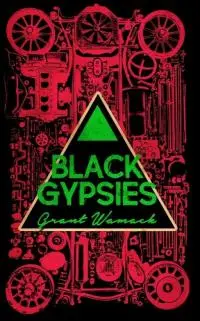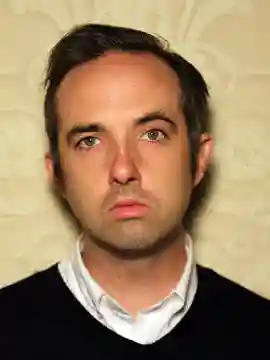Photo courtesy of Grant Wamack
Grant Wamack's Black Gypsies (Broken River Books) is an inner-city existentialist adrenaline rush that, in all its urban suffocation, reminds itself to breath. There's a unique spiritual element to this cinematic wide-shot of jackboy brotherhood and gangster antagonism; refusing to forget the moments of silence for collateral damage and impending dead. Marcus and Gordo run like tigers through the streets of Chiraq, endangered by the threat of their own generation until Marcus finds the most looming danger can be love itself. Wamack's other novel, God's Leftovers (Bizarro Pulp Press), is also out this fall.
Black Gypsies is unmistakably grimy but in a lived-in kind of way, where it's almost comforting, or at least feels familiar. You’re an L.A. guy but the story takes place in Chicago—what’s your history with that city, and could this story have happened anywhere else?
I grew up in various parts of Chicago, some good, some bad, but I was mostly exposed to the bad. My mom’s side of the family stays out there, so it’s close to my heart. Like my grandma might call me and tell me about how kids on the Westside stole her car, drove it around, but will return it by the end of the day out of some strange respect. It definitely couldn’t take place in any other city. The gang culture is pretty unique out there…you’ll see Gangster Disciples, Vice Lords, Black Disciples, Stones, Latin Kings, Four Corner Hustlers, etc. that are hardly mentioned in crime fiction. So I wanted to remedy that with Black Gypsies. Also, there are a bunch of references, slang, and music artists specific to the Windy City.
I love LA, but I would have to do a complete overhaul and write Black Gypsies very differently in terms of characters/setting for the book to feel authentic out here.
For intense urban crime fiction, BG is also very meditative, almost relaxing. How do you reconcile this chill approach to a genre that often demands sustained climax?
 I wanted to cultivate an intensity similar to the Safdie brothers' films, but I’m also a very spiritual person who lives in the present moment on a daily basis. This calm spiritual energy bled into the seams of the narrative where you might notice beautiful details even when things feel like they’re spiraling out of control or death is on your heels. I pay respect to the genre, but I don’t let it entrap me, either.
I wanted to cultivate an intensity similar to the Safdie brothers' films, but I’m also a very spiritual person who lives in the present moment on a daily basis. This calm spiritual energy bled into the seams of the narrative where you might notice beautiful details even when things feel like they’re spiraling out of control or death is on your heels. I pay respect to the genre, but I don’t let it entrap me, either.
Speaking of climaxing, you’re exceptional at writing sex. With one scene in particular between Marcus and Zoe, you really integrate the experience of their respective beings rather than writing about someone fucking someone else. Is there a “right” way to write sex?
Thanks, man! I love sex and try to channel that passion into my writing. I think there is a right way to write sex and a wrong way to write sex for sure. I strive for authenticity and try my best to pin down that raw primal urge to connect with another person on a physical level. I think writers get too caught up with using certain words that take away from the experience like “member” or “rod” or worry about coming across in some embarrassing form or fashion. You have to be willing to get intimate with the reader in a sense and be vulnerable. Remember men and women operate differently, and have specific needs and desires that overlap, but differ. Draw on your own experiences in an honest way and revise it until it rings true.
BG is a brief 115 pages, but so much goes down at such an easy pace that it felt like epic cinema—it took me exactly two hours to finish it, just like a film. Do you think books should strive to be shorter in order to compete with the small commitment of time people give to movies?
I appreciate that. A short cinematic book was my aim. I think it depends on the specific book and what the writer is trying to accomplish, but younger people’s attention spans are a lot shorter, so I try to cater to that shift in society. I think novellas and short novels can compete with movies though. I’ve watched people scroll through Netflix or Hulu for 15 minutes straight and still not find something to watch. I feel like short books can scratch that itch for people who don’t have a ton of time on their hands, but want some good entertainment.
You’re an outspoken advocate of smoking marijuana. How do you believe it helps or hinders creativity? For me, smoking weed can put me right there in the zone to write and carry me through hours of output, but then when I gotta deal with real life, things can fall through holes in my memory.
I think it depends on the person, but you have to be open to experimenting with different strains and know your tolerance. I’m a pretty disciplined person, so I won’t smoke when I have important things to do or a project requires a certain level of focus. Personally, it helps me a lot when it comes to revisions and if I want to immerse myself in the story on a deeper level, but you never want it to turn into a crutch either. Sometimes I might have anxiety or fear surrounding a certain chapter I’m working on and weed helps me side-step the bullshit and get the job done. Hybrid strains are usually my go-to when it comes to writing, and Canndescent has one strain called Create that has helped me a lot. Quite often, I’m surprised by the level of creativity, expansiveness, and depth, weed unlocks. Everyone should try it and see what happens.
How does your Tarot card practice relate to your writing—do you see the Tarot as another viable way to tell a story about yourself or others? Does the Tarot foresee or merely affirm?
Tarot is a way of life for me. It’s like an esoteric GPS system that helps me avoid potholes and bad situations. I’ll pull cards to see how the book is going, sort of a check-in with myself and the universe. When I’m done with a draft, I’ll pull cards to see how people will react and how successful the book will be. Also, I’ll pull tarot cards for different publishers to see if they’re a good fit for me or not. Tarot is a storytelling device even if you don’t write. For instance, I might have a client ask me about a job, a lover or moving to a new city, and the sequence of cards will lay out a unique story about how things will play out. So it’s definitely a viable way to tell a story about myself and others.
Tarot cards can foresee and affirm, it really depends on the question you ask. Let’s say I have a cool writing opportunity, the cards will foresee the most realistic path and trajectory at that point in time. I might have a feeling in my gut about a person and many times tarot will confirm my suspicions.
Get Black Gypsies at Bookshop or Amazon
Get God's Leftovers at Bookshop or Amazon

About the author
Gabriel Hart lives in Morongo Valley in California’s High Desert. His literary-pulp collection Fallout From Our Asphalt Hell is out now from Close to the Bone (U.K.). He's the author of Palm Springs noir novelette A Return To Spring (2020, Mannison Press), the dispo-pocalyptic twin-novel Virgins In Reverse / The Intrusion (2019, Traveling Shoes Press), and his debut poetry collection Unsongs Vol. 1. Other works can be found at ExPat Press, Misery Tourism, Joyless House, Shotgun Honey, Bristol Noir, Crime Poetry Weekly, and Punk Noir. He's a monthly columnist for Lit Reactor and a regular contributor to Los Angeles Review of Books.








